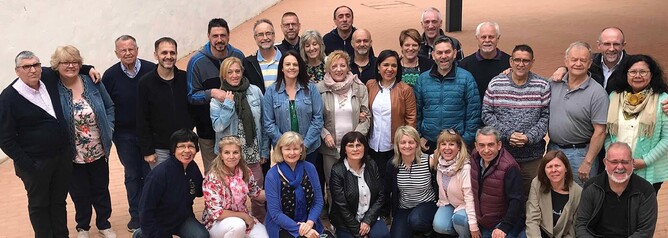The Betel ministry began as an attempt in the early 1980s to plant a church in a large suburban area of Madrid, Spain, known as San Blas. As a tiny multi-cultural missionary team we envisaged a church planted amongst people to whom the Holy Spirit was guiding us were the local heroin addicts! Initially baulking at the idea, we took the baby steps towards helping two addicts to enter a small Christian rehabilitation centre in the north of Spain.
This deeply challenged our whole concept of church-planting. Though we obeyed the Holy Spirit’s promptings, there was an underlying conviction that this would not work. How can one start a church with such broken people? Surely we were hearing wrong! The game-changer came when one day Raul, a local gang leader, implored me to help him because he was desperate to leave his heroin addiction and the accompanying lifestyle, but wasn´t permitted to leave the confines of Madrid for the four hours’ drive to the aforementioned Christian rehab centre due to a ruling by the court. I was single at the time, and against my better judgement I invited him to my apartment until we could work out something. The agreement was for two weeks maximum. None of us realised at the time that that invitation would lead to the growth and expansion of an international work amongst drug and alcohol addicts and their families through 100+ self-financed communities spread over 23 countries, known as ‘Betel’. That initial church plant in San Blas is now a fully-orbed church of 700+ people.
Next year, as we approach the 35th anniversary of those small beginnings, we look back on the many ups and downs over that time. In the mid-1990s the reality of AIDS hit us like a ton of bricks as those first wave of men and women, now leaders and role models, began to succumb to this deadly disease acquired by the needle-sharing and promiscuous living of their old lives. We were forced to adapt to the sudden loss of so many of our most trusted leaders (who had become pastors). This dire situation, however, compelled others to step up and take their place. It was a time of accelerated grace and fast-tracked maturity. At the same time that we were losing our most trusted leaders, the Lord was also pushing us out of San Blas to other areas of Spain — and even beyond Spain to other countries of Europe.
The new millennium opened up to us the realities of Eastern Europe, Africa and Asia as we sent teams of Western European ex-addicts to Moscow and St Petersburg (Russia), Prague (Czech Republic), Sofia (Bulgaria), Pretoria (South Africa) and New Delhi (India) — men and women, grateful for what God had done in their lives and sensing His call to reach people like them in other countries. Missionary work with a difference, indeed! Within a decade the Russian team had opened communities in Finland, Ukraine, Estonia and Kazakhstan. The Delhi team had sent out groups of discipled ex-addicts to establish communities in 16 different Indian cities, opening up a bridgehead in Kathmandu (Nepal) and Ulaanbaatar (Mongolia). The Kathmandu team then opened up in the Nepalese cities of Pokhara and Butwol, whereas the Mongolian team opened up communities in the cities of Darkhan and Zamin Üüd.
These ministries are now entirely run by nationals, who themselves have caught the missionary vision. The Russian team have Belorussia, Armenia and Iran in their sights. The Indian team are actively looking at Myanmar, Bhutan and other neighbouring countries. The Mongolian team are looking at Eastern Siberia and Inner Mongolia.
Betel South Africa, having gone through very challenging times, almost to the point of closing down, has come out of those trials bigger and stronger. The team there has been able to create and sustain a large, multi-racial community which is a powerful testimony to the still racially-divided South African society.
The Philippines islands are beckoning to us and we are hoping to send a team there in the near future. What is the Lord’s time for this?
On the other hand, apart from the encouraging expansion in the United Kingdom (which has a long waiting list of people wanting to enter), the growth in the Western European works has practically come to a standstill. Yes, the established works there have planted churches parallel to their residential communities, but there is a pervasive sense of maintenance rather than fresh growth and expansion touching a new generation. There are vast moves of God currently under way in Africa, Asia and South America. We are asking the Lord to also meet us in a fresh way for a new period in the history of Europe so we can continue to be fruitful in those countries traditionally known as the bastions of Christianity, but who have become spiritually dark “having a form of godliness but denying its power”.
With these issues in mind and looking to the future, last year we formed an International Presbytery or Eldership consisting of 17 senior leadership couples from around the world. We meet twice a year for prayer and strategizing, pooling the wisdom of years in order to ascertain the way ahead and continue to be relevant, not just for the season we are now living in, but also for what is yet to come for the Betel ministry.
In September 2011, having handed over the works in Spain and Italy to national leaders, Myk and I came back to Australia to focus on growing Betel Australia. Over the last seven years we have been through all sorts of peaks and valleys, but these last eight months have been some of the most discouraging since we commenced the ministry. In July last year, almost overnight, the phones stopped ringing and the referrals from government detoxification centres ceased. Were they told not to recommend faith-based organisations? We checked with other similar Christian ministries, who told us a similar story.
We decided to fight back by increasing our publicity and even took on new initiatives of paid advertising on Christian radio and social media. In all the ‘darkness’ of fruitlessness, we are taking more time out to dedicate to prayer, seeking the Lord more intentionally for guidance. There is a change in the air, certainly in the political sphere, but also in society in general. Many agree that in these times there is a general sense of not having the normal reference points — that we are travelling in uncharted waters here in Australia. What is God saying to us? Psalm 121 tells us that the Lord neither slumbers nor sleeps, so we know that He is up to something, but what is He doing? The prayer of Norman Grubb has come back to us stronger than ever: “Good morning Lord. What are you doing today? May I be a part of it?”
This morning in our daily devotions, Myk and I both read the same passage from Luke 13 about the Parable of the Barren Fig Tree and the gardener’s reply to his master who complained about no fruit: “Sir, leave it alone for one more year, and I’ll dig around it and fertilize it. If it bears fruit next year, fine! If not, then cut it down.” In other words, rather than throwing our hands up in exasperation, we are redoubling our efforts and at the same time trying to discern where our energies should be concentrated and what that would look like — working not so much for the Lord but with the Lord.
Would you pray for us that we will be like the sons of Isaachar in 2 Chronicles 12:32 “who understood the times and knew what Israel should do”? Thank you!
by Lindsay McKenzie

